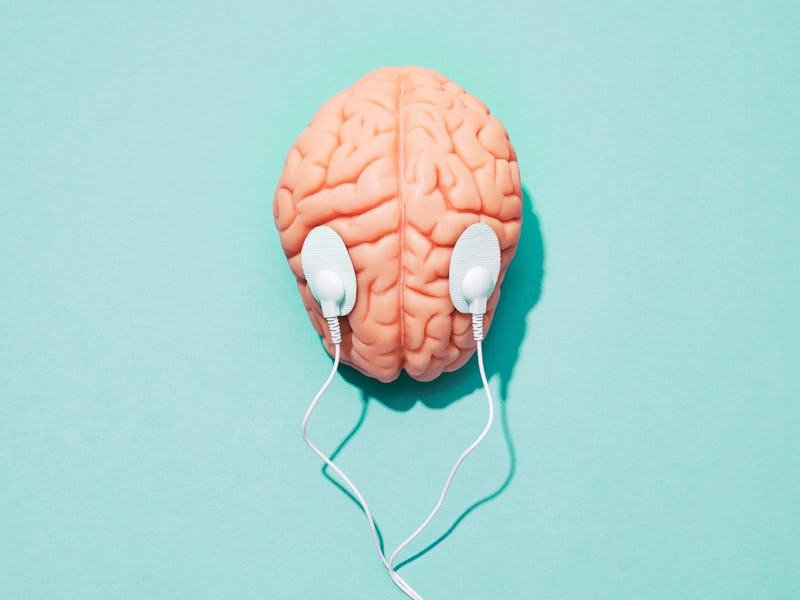Did we really find proof that life flashes before our eyes when we die?
What that viral brain study really says.

On Wednesday, a flurry of headlines and a trending Twitter topic arose about a study published in Frontiers of Aging Neuroscience. Researchers had caught a rare glimpse of recorded brain activity in the moments preceding and following death. But can this actually tell us anything about what happens when we die?
Of course, both my excitement and my skepticism were piqued. It’s a rare and exciting day for a health reporter when there’s so much buzz around a neuroscience study that it’s trending on Twitter. Very often, though, it’s also a cause for skepticism.
Headlines proclaimed, “Brain scans on a dying man suggest his life flashed before his eyes, researchers say; Life flashing before your eyes: Scientists record brain activity in a man’s final moments; It’s true - life may well flash before your eyes when you die. A closer read of the study reveals some interesting insights about the moments preceding one man’s death and some clear lines between what was documented and what the scientists speculate might be happening. But as far as a conclusive guide to our thoughts surrounding death? Not so much.
The background — An international team of researchers analyzed a continuous EEG — which measures electrical activity in the brain — of an 87-year-old man in the minutes before and after his death. The man had been admitted to the hospital in the wake of a fall, and he was hooked up to an EEG machine to detect seizures. While the EEG was happening, the man suffered a cardiac arrest and died. As a result, researchers had about 900 seconds of a continuous EEG in the moments around the man’s death.
What they found — The researchers focused on the 30 seconds prior to and immediately after the man’s heart stopped beating. In the final seconds before his death, researchers noticed a spike in a type of electrical activity called “gamma oscillations.” Gamma, delta, alpha, beta, and theta oscillations (or “waves”) refer to the speed of electrical activity in the brain.
In particular, Gamma oscillations are the fastest of any brain waves and are associated with alertness, concentration, dreaming, and memory recall.
The increase in Gamma waves occurred simultaneously as a reduction in delta, beta, and theta waves. Delta, theta, and alpha waves occur in relaxed (resting) states or sleep. Beta waves are associated with alertness and focus.
What it means — It seems clear that some kind of memory activity was taking place in the moments immediately before and after the man’s heart stopped. This also suggests that our brains remain active very briefly after our hearts have stopped beating.
The researchers say some of this is similar to EEG activity seen in rodents immediately after cardiac arrest. But obviously, humans and rodents are not the same. Some notable differences between them are which gamma bands and primary waves are involved.
In the moments immediately before and after his heart stopped, a man’s brain showed signs of recalling memories.
Alpha waves primarily modulated all bands of gamma waves in the human; in rodents, low-frequency gamma waves are modulated by all the other brain waves. This is notable, the researchers say, because “the alpha band is thought to interfere in cognitive processes by inhibiting networks that are irrelevant or disruptive.”
Here’s where the researchers clearly say they’re speculating about what that might mean. They write, “Given that cross-coupling between alpha and gamma activity is involved in cognitive processes and memory recall in healthy subjects, it is intriguing to speculate that such activity could support a last ‘recall of life’ that may take place in the near-death state.”
But does this actually reveal what happens in the brain immediately before and after death? Not necessarily. The researchers outline a number of caveats that make it impossible to determine from this one case report, what happens in the human brain in the seconds surrounding death. They note the small sample size (literally one), interference from traumatic brain injury, or drugs administered to the man after he was admitted to the hospital.
Why it matters — It’s incredibly exciting to think we might have a better window into the brain immediately before and after the fate that awaits all of us. It seems likely that some type of recall or memory activity is possible in those critical moments, but it's impossible to know for sure. If we assume we know more than we do, we can unintentionally close ourselves off to other possibilities. There’s so much to learn about the neuroscience associated with death, let’s not jump to early conclusions.